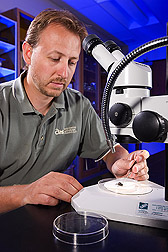05
Jan
Federal Judge Permits USDA Whistleblower Case to Proceed
(Beyond Pesticides, January 5, 2016) An administrative court judge has agreed to hear a case filed by a U.S. Department of Agriculture (USDA) pollinator researcher who says his firing by the agency was retaliation for his cutting edge research linking neonicotinoid insecticides to declinining monarch butterfly populations, which has drawn national attention and international recognition. Late last year, Judge Patricia M. Miller of the Merit Systems Protection Board denied USDA’s request to dismiss a claim filed by Johnathan Lundgren, PhD, a USDA employee for eleven years with high accolades.
 In April of last year, Dr. Lundgren published a study in The Science of Nature (pdf) that shows that clothianidin, a neonicotinoid insecticide often used to coat seeds, kills monarch butterfly larvae in the laboratory. On August 3, 2015, USDA imposed a 14-day suspension against Dr. Lundgren for submitting the study and for a paperwork error in his travel authorization for his invited presentation about his research to a panel of the National Academy of Sciences, as well as to a USDA stakeholder group, the Pennsylvania No-Till Alliance. The suspension was cut to 14 days from 30 after Dr. Lundgren filed an appeal.
In April of last year, Dr. Lundgren published a study in The Science of Nature (pdf) that shows that clothianidin, a neonicotinoid insecticide often used to coat seeds, kills monarch butterfly larvae in the laboratory. On August 3, 2015, USDA imposed a 14-day suspension against Dr. Lundgren for submitting the study and for a paperwork error in his travel authorization for his invited presentation about his research to a panel of the National Academy of Sciences, as well as to a USDA stakeholder group, the Pennsylvania No-Till Alliance. The suspension was cut to 14 days from 30 after Dr. Lundgren filed an appeal.
In October 2015, Dr. Lundgren, respresented by Public Employees for Environmental Responsibility (PEER), filed a whistleblower complaint against USDA, claiming it “gave no substantive reason” for denying Dr. Lundgren’s travel request and made “repeated attempts”¦to impede or deter his research and resultant publications.” Dr. Lundgren’s research on the harm neonicotinoids pose to monarch butterflies reflects a growing scientific consensus that these chemicals present significant risks to declining pollinator populations. However, as stated in the complaint, despite receiving approval for the paper through proper protocols, higher-ups at USDA deemed the research “sensitive,” and claimed that Dr. Lundgren had not received approval to publish the study.
Judge Miller’s ruling is a strong rebuke to an agency that asserted Dr. Lundgren’s complaint was “frivolous” and based on information that was “speculative and unsupported.” USDA and Dr. Lundgren were ordered by the court to convene a status conference on January 6, 2016, to discuss a potential settlement, according to the Washington Post. “We were very pleased to receive Judge Miller’s ruling,” said Laura Dumais, the PEER attorney representing Lundgren to the Washington Post, “as we feel Dr. Jonathan Lundgren has a very strong case.”
In April 2015, PEER filed a petition for rulemaking with USDA, urging the agency to strengthen its Scientific Integrity Policy and adopt best practices used in other federal agencies in order to prevent politicized suppression or alteration of studies. The group claims that at least 10 USDA scientists have been investigated or have faced other consequences as a result of research questioning the safety of certain pesticides. The current policy disallows scientists from “making statements that could be construed as being judgments of or recommendations on USDA or any other federal policy, either intentionally or inadvertently.”
“The job of a government scientist is to conduct research to help guide policy,” said PEER attorney Laura Dumais to the Washington Post, “so prohibiting them from saying anything that could even be ”˜construed’ as commenting on policy essentially gives supervisors the right to punish anyone they want, for giving any interview at all. Dr. Jonathan Lundgren’s case is a textbook example of that.”
With science both in and outside of the U.S. pointing to a growing list of impacts from pesticides and genetically engineered (GE) crops, ranging from the decline of bees to the carcinogenicity of the widely used herbicide glyphosate, it is critical that federal scientific agency staff tasked with protecting human and environmental health are able to inform the public without repercussions.
Help us defend independent science by signing this petition to USDA today!
Dr. Lundgren will join Beyond Pesticides for a presentation at the 34th National Pesticide Forum in Portland, ME on April 15-16, 2016. The conference brings together top scientists, policy makers, and public health and environmental advocates to interact, engage in dialogue, and strategize on solutions that are protective of health and the environment. Aaron Blair, PhD, chair at the International Agency for Research on Cancer, another target of chemical industry pressure after a finding that glyphosate is carcinogenic based on laboratory animal studies, will also speak at the Forum.
Reserve your spot today to receive the Early Bird Discount rate ($5 off)! For more information and to purchase tickets, see this webpage.
All unattributed positions and opinions in this piece are those of Beyond Pesticides.
Source: Washington Post











Dr. Lundgren shared insights on his research, the difficulty scientists face when questioning accepted paradigms, and the extensive use of neonicotinoid pesticides on Food Sleuth Radio on December 31st. Part II airs on January 7th:
January 6th, 2016 at 12:53 amhttp://www.prx.org/series/32432-food-sleuth-radio